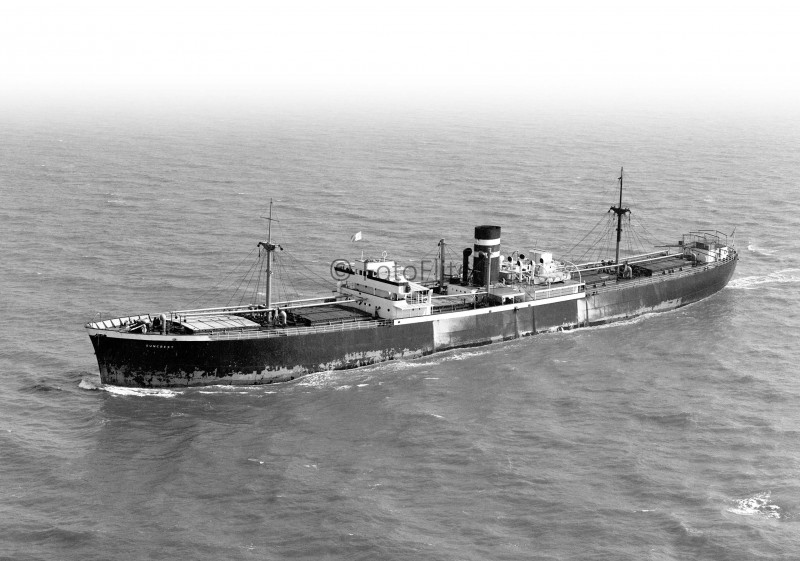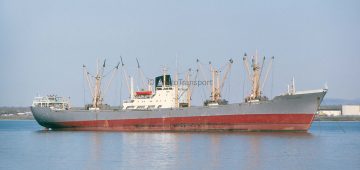1941: West Africa & The Mediterranean
In London, in November 1941, the Suncrest loaded general cargo for West Africa and set off round the North of Scotland for Oban, where Capt. H. went on sick leave. Capt. McLaren took over command, a dour Scot from Ardnamurchan, but a great shipmate. I served with him until I was eventually given my own command. The only thing, he would never let me practise with those depth charges! Just as well, for when we returned to the U.K. they were removed. If we had fired them, we’d probably have blown off our stern, as we were too slow to get out of their way! With most of our equipment, we learnt by trial and error.
We had cargo for Bathurst and Freetown. Among the cargo for Bathurst, we carried a fire engine and an ambulance for the R.A.F. station there. With no quay, we had a terrible job unloading them onto a barge, but with great difficulty we managed. We had landed the fire engine first with a sergeant of the R.A.S.C. to drive it. This was followed by the ambulance, towed behind it with Second officer H. to steer it. I was on the fire engine, in charge of the bell and the searchlight. I made full use of my equipment. Unfortunately, no one had told us that there was a blackout exercise in progress!

We went on to Freetown where the port was so badly organised that we lay there for a month or so discharging. Eventually word must have arrived in London about the delay and the discharging quickened up. Just in time. We had not been allowed any stores to replace those we had consumed. We could get yams, but we had no other fresh food. At first I liked yams, but after a month or so I hated them. We all lost weight. My collar size was down from 16 to 13.
We then went to Pepel to load iron ore. It broke my heart, a new ship loading iron ore. But at last we were on our way home, very angry with the delays. We arrived in Cardiff, where we got rid of the iron ore and the owner came on board to see us.
“What sort of a trip have you had, Jimmerson?” I was speechless and gave him a typed list of the day-to-day happenings in Freetown.
“Leave this with me!” he said, and he must have read the riot act in the proper places, for a question was asked in the House of Commons. “Did the Minister realise the appalling conditions existing for Merchant Seamen in West African ports?”
Our next trip was again to West Africa. We took solid ballast, some general cargo and an assortment of planes for Takoradi. When we arrived, I was informed by the powers that be that they would be in charge of the discharge of the cargo etc. etc. after the first day’s work, I was in my cabin when the general Manager for Elder Dempsters knocked and informed me that the labour had gone on strike. “Could I discharge the remaining aircraft?”
It was after 5 o’clock and most of my crew had naturally gone on shore, but I was able to muster the Bosun, Carpenter, Second and Third officers and myself, and, most important, four Engineers. There was also one R.A.F. corporal and a young fellow from the office and three radio officers, all ignorant about handling cargo. We had to muster every cargo cluster on board and unfortunately at times the load was too much and we were blacked out. Whilst the Engineers were fixing the lights, others stood at the hatchway holding two or three large torches to light up the lower hold. Here the R.A.F. Corporal and the young fellow from the office were hooking on the lifts which the Second officer and myself had brought from the after end of no. 3 on the aerial glide system to the centre of the hatchway. Each of the Hurricanes or Spitfires weighed about five tons. I have often wondered whether the shore labour went on strike because the discharge of the remaining planes was too difficult for them to manage.
We managed to discharge all the planes without damage.
The next morning the Beach Master, supposed to be in charge of all operations but missing during our efforts, came on board to finish the easy work. I told him that we had done a great job, even the young man from the office.
“Young man, be b……d” he said. “That was Capt. Cripps (late of the Tank Corps). He’s the son of the boss.”
Later a crate of flagons of McEwans Export was sent on board with the compliments and thanks of Capt. C. He hadn’t minded my shouting orders.
We then had to proceed every morning into the bay to discharge the ballast oversides. We had three tribes as stevedores and the agents, probably mindful of their labour problems, told me that they expected us to be ready for loading in six days time.
On the third day I signalled “ready for loading at 1500 hours”. “Which day?” came the reply. “Today” was the answer.
When we berthed, they asked us how it was done, and I told them “I treated them as human beings and they worked splendidly”. My memory of Takoradi was the Headman coming to see me before we sailed. “Sahib, next time you come, all men come from jungle to help”.
We loaded for Freetown and from there we went in ballast to America to load for the U.K.

We sailed from the U.S.A. with a full cargo of wheat. Again the Atlantic was angry and the convoy scattered. Unfortunately, Suncrest was of such a length that we always took three swells or seas. Occasionally the stern didn’t lift before the third sea hit us. The weather was atrocious and we were pooped, the third sea roaring from aft. I awakened to see my carpets floating.
We hove to and commenced clearing the debris. At daylight we thought we were alone on the ocean when a destroyer appeared.
“HMS. Wanderer at your service. Can we help?”
“Thank you, we’re clearing the mess, then we can proceed”.
“Sorry can’t stay with you. Good luck. The convoy is bearing … such and such” and off she went to sort out someone else.
Incidentally the water even flooded the Steward’s store room. What a mess. We also lost some of the wheat in no. 3 hold, but the rest of the vessel was o.k. Capt. Mac and I slept on the chartroom settee until our own accommodation dried out. We soon caught up with the convoy and proceeded across the Atlantic to Cardiff with our precious cargo.
Having discharged our wheat, we went to Swansea to load again for West Africa. This time it was a hundred plus Hurricanes and Spitfires for Accra and Lagos. I was going on leave and I told the Merchant Navy assistant (Capt. McN. from Furness Withy, ashore because his own ship had been lost) that I expected the planes to be secured and that I would inspect the holds when I returned.
I returned to find the loading almost completed and, putting on a boiler suit, I went with Capt. McN. to inspect the holds. In no. 1 hold, I found No lashings and No shores. The same in no. 2 hold. I exploded and told Capt. McN. (politely, of course!) that it was no use, the cargo wasn’t safe. He said that the Commander R.N.R. in charge had said there was no need to do any securing. The same Commander was with Capt. Mac. Asking him to sign the clearance as the ship was ready to sail.
“I’ll wait for Jimmy” said Capt. Mac.
“Captain” I said “We can’t sail, the cargo is not secure.”
“Secure the cargo, Commander” said my old Man, and it was done, but it took 36 hours making all secure.
Apparently the Commander had not learnt from this, because the Chief Officer of the Junecrest had a similar experience later.
We expected to be in the black books, but when we returned to the U.K. we heard that our owners had been complimented by the admiralty on the efficiency of their Chief Officers.
We sailed south and 2 days before the Straits of Gibraltar we were spotted and attacked by a Focker Wolfe. He approached from astern and I fired 56 rockets from our ‘Pigs Trough’. They missed and he dropped a stick of bombs. He missed and we were sprayed with water only. Before he could attack again our guardian angel came to the rescue in the shape of a Catalina Flying Boat. He had seen what was happening and flew towards the Focker Wolfe even though he would be outclassed by the Focker W, which broke off from attacking us to chase the Cat. I expect he thought the Cat was easy meat. They flew off, the Focker Wolfe chasing the Cat northwards. Imagine our horror, when almost at sea level there was a tremendous splash and explosion. We were sure our lads had been hit. The Focker Wolfe did not come back and we put into Gibraltar for assembling the African Convoy.
Captain Mac. and I went ashore, and when we were in the Bristol Hotel I turned round at the bar and who should be next to me but Dennis Briggs from Monkseaton, where we were both born and grew up. Briggo flew Catalinas.
“I suppose you’re the pilot of the Catalina that flies backwards !?“ I said. An intelligence officer who was there heard me and insisted on learning about the attack. Briggo hadn’t been hit. He had deliberately coaxed the German down to sea level and then let go a depth charge under the Focker Wolfe’s belly. No wonder he flew off and left us in peace!
We then made our way to Accra and Lagos to unload our cargo of planes. All were intact. As each plane was offloaded, assembled ashore and flight tested, it dipped over the ship in salute before proceeding to the Western Desert.
We next sailed north to Beni Saf to load iron ore for Middlesbrough. Again we were fortunate. As we cleared the port and were proceeding towards a convoy which we were to join, the Senior Escort flashed “Hard a starboard”, which of course we did. There was a submarine lying in wait for us. With a cargo of iron ore, we wouldn’t have stood a chance.

We made Middlesbrough safely and at the end of April I went home on leave and was married to you-know-who, Myfanwy! 6th May 1943.
Continued next month



Comments
Sorry, comments are closed for this item